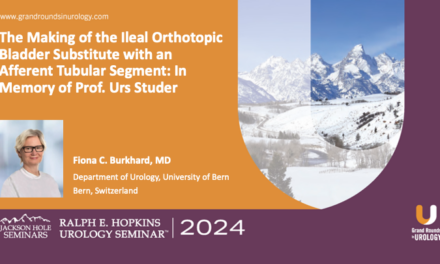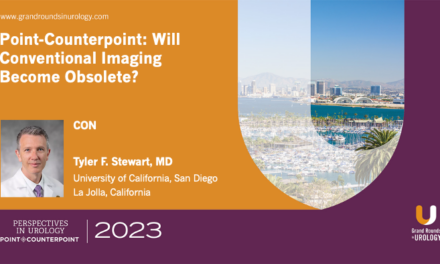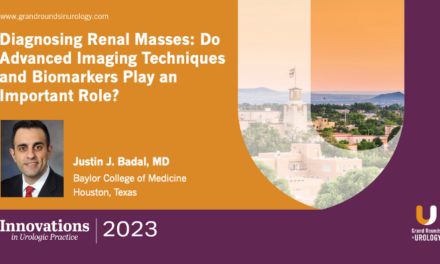Guilherme Godoy, MD, MS, presented “Surgical Training for Radical Prostatectomy – Should the Open Approach Still Be Taught? Which Patients? Retropubic, Perineal, Mini-Incision, etc.?” at the 27th Annual Innovations in Urologic Practice conference on September 22nd, 2023.
How to cite: Godoy, Guilherme. “Surgical Training for Radical Prostatectomy – Should the Open Approach Still Be Taught? Which Patients? Retropubic, Perineal, Mini-Incision, etc.?.” September 2023. Accessed Jun 2025. https://grandroundsinurology.com/surgical-training-for-radical-prostatectomy-should-the-open-approach-still-be-taught-which-patients-retropubic-perineal-mini-incision-etc/
Surgical Training for Radical Prostatectomy – Should the Open Approach Still Be Taught? Which Patients? Retropubic, Perineal, Mini-Incision, etc.? – Summary
Guilherme Godoy, MD, MS, explores the question of whether or not to teach residents open radical prostatectomy, weighing multifunctional surgical skills with robotic advancements. He then explains that, while the open approach to radical prostatectomy is the gold standard in the medical community, the robotic approach is more commonly performed.
Dr. Godoy proceeds by questioning whether a sufficient number of open-approach radical prostatectomies are being conducted to warrant training residents in this method. Referring to a 2020 study, he finds that perhaps too few open-approach procedures are occurring to allow for resident proficiency.
Dr. Godoy then asks whether the open approach offers any benefits, exploring four situations in which the open approach is preferred over the robotic method. Dr. Godoy then cites a 2007 study to evaluate the learning curves of open-approach radical prostatectomy subtypes compared to the robotic approach, finding drastic differences in the climb to proficiency.
He completes his presentation by stressing that resident skill and comfort level should be considered in the debate between the open and robotic approaches. Following the presentation, audience members offer points of consideration regarding rural populations, new robots, and current robot malfunctions during radical prostatectomies.
About The 27th Annual Innovations in Urologic Practice:
Presented by co-chairs Mohit Khera, MD, MBA, MPH, and Michael Coburn, MD, FACS, the Innovations in Urologic Practice conference provides a detailed review and commentary on multiple genitourinary and urologic diseases. Among the featured oncological topics are bladder cancer and immunotherapies, as well as upper tract cancer management, prostate cancer, including state-of-the-art imaging, focal therapy, and MRI. Experts also discuss new tools and techniques for nephrectomy and treating advanced renal cell carcinoma. In terms of general urological approaches, the conference also includes pelvic reconstruction and trauma; men’s health topics like male infertility, andrology, and sexual dysfunction; OAB and voiding dysfunctions; and ways to diagnose and treat infections in the urology patient.
For further educational activities from this conference, visit our collection page.
ABOUT THE AUTHOR
Guilherme Godoy, MD, MS, serves as assistant professor of urology at the Baylor College of Medicine (BCM) in Houston, Texas. He joined the faculty of the Scott Department of Urology at BCM in 2012 and has been the chief of the urology service at Ben Taub General Hospital (Harris Health System), since 2017.
Dr. Godoy earned his medical degree from Fundacao Universitaria do ABC in Sao Paulo, Brazil. His training includes an internship and residency in urology at Santa Casa De Sao Paulo in Vila Buarque, Brazil, and a fellowship in urologic oncology at BCM. Dr. Godoy has also completed urologic oncology fellowship training at Vancouver General Hospital, New York University, and Memorial Sloan-Kettering Cancer Center. He earned his MS in clinical investigations at BCM and has remained active in clinical research, translational studies, and clinical trials, mostly focused on prostate, urothelial (upper and lower urinary tract), and testicular cancers.
Dr. Godoy’s expertise includes early diagnosis, minimally invasive approaches (endoscopic and robotic), utilization of molecular and genetic tools for personalized decision-making, management of hereditary cancers, and surgical management of complex/large genitourinary (GU) tumors. His clinical areas of interest include adrenal and kidney tumors, urothelial cancers (upper and lower urinary tract including ureter, renal pelvis, bladder, and urethra), prostate cancer, penile cancer, and testicular and paratesticular cancers. Dr. Godoy also specializes in the utilization of intestinal segments for urinary tract reconstructions, and coordination of multidisciplinary approaches to manage complex intra-abdominal, retroperitoneal, and pelvic tumors. Dr. Godoy is responsible for and moderates the GU Tumor Board Meetings at Baylor St. Luke’s Medical Center as well as the St. Luke’s International GU Tumor Board Meetings.




